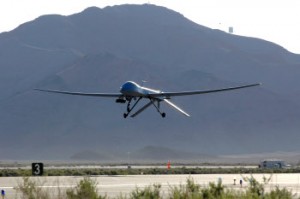Twenty-six members of Congress have called on President Barack Obama to provide a legal justification for so-called “signature” drone strikes that the CIA and special operations forces have been launching in Pakistan and Yemen.
 Signature strikes are drone bombings that target individuals that the administration cannot identify. Decisions to kill a person or group of people in these countries can be based on “suspicious behavior,” a loosely-defined judgement that would give the administration carte blanche to kill whoever it pleases.
Signature strikes are drone bombings that target individuals that the administration cannot identify. Decisions to kill a person or group of people in these countries can be based on “suspicious behavior,” a loosely-defined judgement that would give the administration carte blanche to kill whoever it pleases.
The request to provide legal justification is warranted, but is unlikely to be heeded by the administration. The technically covert nature of the drone program – even though everyone knows about it – has so far allowed them to dismiss court challenges for the legality of these strikes.
The United Nation human rights chief last week called for a UN investigation into U.S. drone strikes in Pakistan, on the grounds that their legality is questionable and that they indiscriminately kill innocent civilians.
A recent New York Times article quoted administration officials describing how low the standards are for choosing targets. “Some State Department officials,” the Times reported, “have complained to the White House that the criteria used by the C.I.A. for identifying a terrorist ‘signature’ were too lax.”
The report added: “The joke was that when the C.I.A. sees ‘three guys doing jumping jacks,’ the agency thinks it is a terrorist training camp, said one senior official. Men loading a truck with fertilizer could be bombmakers — but they might also be farmers, skeptics argued.”
The House members, led by Reps. Dennis Kucinich (D-OH), Ron Paul (R-TX) and Walter Jones (R-NC), warned in a non-binding letter to President Obama on Tuesday that the “signature strikes” can generate “powerful and enduring anti-American sentiment.”
“We are concerned that the use of such ‘signature’ strikes could raise the risk of killing innocent civilians or individuals who may have no relationship to attacks on the United States,” they wrote. “The implications of the use of drones for our national security are profound. They are faceless ambassadors that cause civilian deaths, and are frequently the only direct contact with Americans that the targeted communities have.”
In order to avoid dealing with the inevitable increase in civilian casualties inherent in employing signature strikes, the administration “embraced a disputed method for counting civilian casualties” that “in effect counts all military-age males in a strike zone as combatants, according to several administration officials, unless there is explicit intelligence posthumously proving them innocent.”
The House members are in accord with a growing chorus of experts and former U.S. officialsin their concern that the overly broad drone war and its indiscriminate targeting procedures are creating more enemies than it is eliminating.
Robert Grenier, who headed the CIA’s counter-terrorism center from 2004 to 2006 and was previously a CIA station chief in Pakistan, said recently the drone program is too sweeping and may be creating terrorist safe havens.
“We have gone a long way down the road of creating a situation where we are creating more enemies than we are removing from the battlefield. We are already there with regards to Pakistan and Afghanistan,” he said.
“If you strike them indiscriminately you are running the risk of creating a terrific amount of popular anger. They have tribes and clans and large families. Now all of a sudden you have a big problem … I am very concerned about the creation of a larger terrorist safe haven in Yemen,” Grenier said.
As Charles Schmitz, a Yemen expert at Towson University in Maryland, told the Los Angeles Times, “The more the U.S. applies its current policy, the stronger Al Qaeda seems to get.”


